Ferries questionpublished at 14:11 GMT 19 February 2020
Labour MSP Daniel Johnson asks whether the government has reviewed its transport procurement processes and criteria, in light of recent issues relating to ferry contracts.
MSPs pass a motion to say there are serious concerns about the performance of the NHS
In a Scottish Labour-led debate, the motion by the party's health spokeswoman Monica Lennon passed by 62 votes to 58
An amendment from Conservative health spokesman Miles Briggs, saying more work was needed on providing "holistic" care to NHS staff, passed unanimously
Health Secretary Jeanne Freeman's amendment fell
Emma Gordon and Craig Hutchison
Labour MSP Daniel Johnson asks whether the government has reviewed its transport procurement processes and criteria, in light of recent issues relating to ferry contracts.
 Image source, Getty Images
Image source, Getty Images
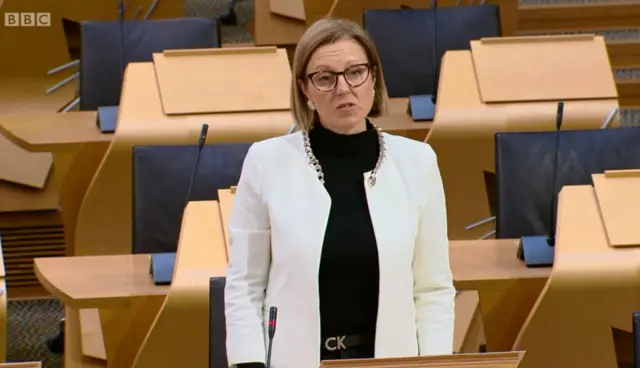 Image source, bbc
Image source, bbcTory MSP Rachael Hamilton led the debate
Starting things off in the chamber this afternoon was a member's debate by Conservative MSP Rachael Hamilton, titled Smoking Ban for Play Parks and Outdoor Sports Facilities.
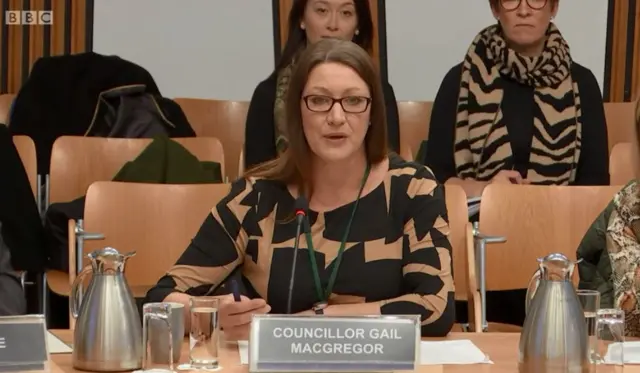 Image source, bbc
Image source, bbcCouncillor Gail Macgregor from Cosla told MSPs she did not believe the Scottish government did not have more cash for the budget negotiations
NEWS SUMMARY:
The new Finance Secretary Kate Forbes and oganisations representing Scotland's councils have given contrasting evidence at Holyrood on the cash coming to local government in the budget.
Councillor Gail Macgregor from Cosla cited a revenue deficit of £95m and called for an extra £300m to 'just stand still'.
Ms MacGregor warned that, as it stands, the budget would have a "detrimental impact" on communities across Scotland.
Overall Cosla are calling for an additional £1bn for councils in this year's budget.
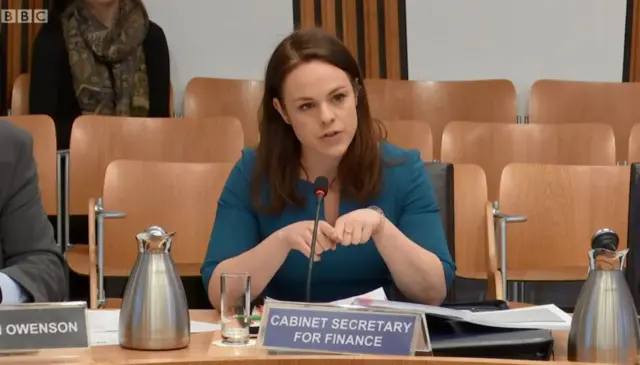 Image source, bbc
Image source, bbcNew Finance Secretary Kate Forbes insisted there was no more money available
However Scotland's new Finance Secretary Kate Forbes insisted local government was receiving a 'fair settlement" in this year's budget.
Ms Forbes said there had been a real terms increase in resource funding for councils of £495m.
Increased cash for councils is the primary demand of opposition parties, if they are to make a deal on the budget with the minority SNP government.
The local government committee session draws to a close.
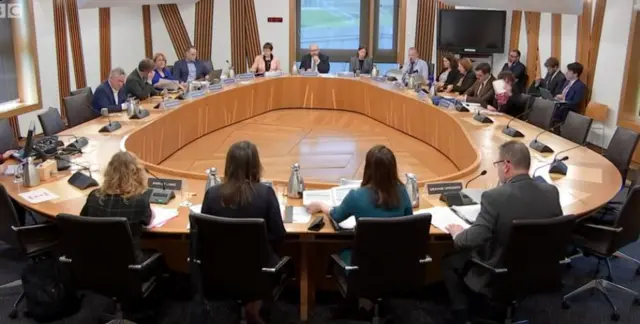
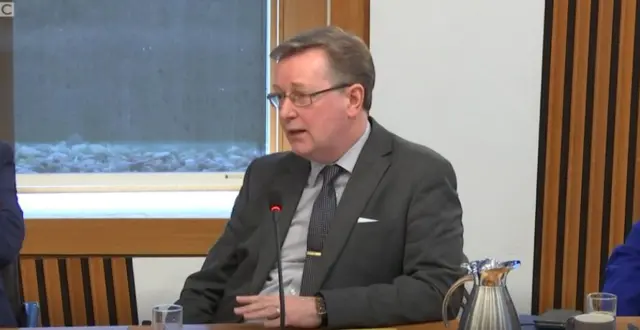
Alexander Stewart tells the panel there is a disconnect between what the government is saying on protecting local government, and what local authorities are saying.
Kate Forbes says the UK budget date of 11 March is very late, and that she has had to project on what kind of money she has to work with.
I can't tell councils how to spend their budgets, she says.
Aileen Campbell reiterates there'd have been more money if the Scottish government wasn't mitigating Westminster policies like the so-called bedroom tax.
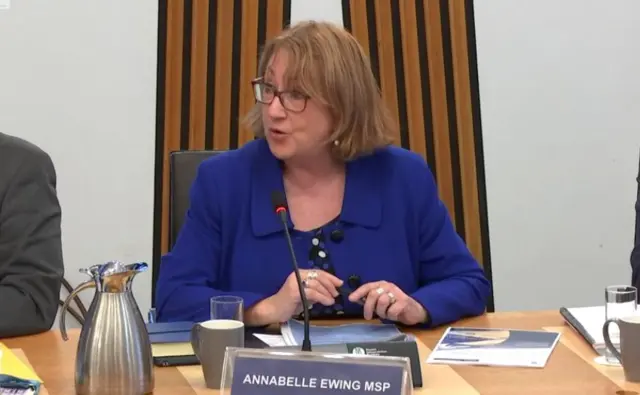
SNP MSP Annabelle Ewing checks with the finance secretary on Cosla's claims of a £95m funding gap.
That's Cosla's number, not my number reiterates Kate Forbes.
We will not remove the council tax cap, she later says.
Local Government Secretary Aileen Campbell says it's hard to check with local authorities on how they've spent money.
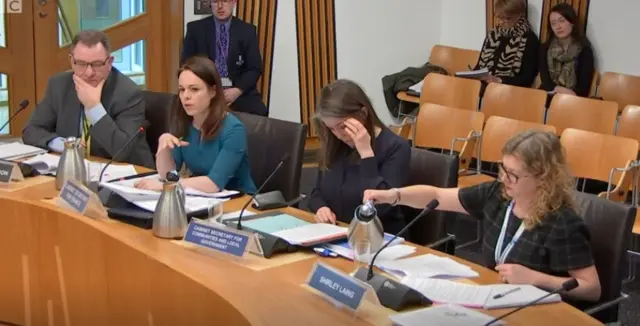
Mr Gibson asks about the Learning Estate Investment Programme - after Cosla complained of capital funding cuts earlier this morning.
Ms Forbes says the funding approach was agreed with local authorities. The new funding model aims to keep the school estate in better condition, she says.
I'm sure we can work jointly on what works best for local authorities, she adds.
Kenneth Gibson asks about council tax rises. Ms Forbes says bills are lower in Scotland than in England.
 Image source, bbc
Image source, bbcSocial services cash is protected by the government or "ring-fenced"
Councils are heavily dependent on the Scottish government for their money.
Some of that money is spent on policy objectives agreed with the government - for example education and health and social care - and they have enjoyed protection.
They could be described as examples of "national services which are delivered locally".
Other major sources of income include the council tax and business rates.
Cosla says national policy initiatives now account for 60% of council budgets - leaving less for those local services which are not protected by the government.
It argues that areas of spending which are not protected by the government - including local roads and pavements, libraries and trading standards - have felt the brunt of the cuts and savings in recent years.
SNP MSP Kenneth GIbson asks if the government has done any work to look at how much can be released from reprofiling loans.
It's not within our gift to interfere with the loans process and those are decisions for local authorities, Ms Forbes replies.
The minister points out that in terms of capital, councils have the ability to borrow and use innovative finance, like the Green Growth Accelerator.
According to the government, under the new Green Growth Accelerator, external, local authorities can borrow to invest in projects which reduce emissions and boost growth.
Mr Wightman points out the government can only have an expectation that council tax will be capped at a rise of 3% in real terms.
The minister says if a council wanted to go above that cap there would certainly be discussions with Cosla and councils, as she insists the settlement is a fair one.
The Green MSP points out there is no formal agreement that Cosla agrees the financial circular.
That's not required says Scottish government official Graham Owenson.
Ms Forbes accepts it is a political choice to pass on all the health consequentials to funding for the NHS.
Mr Wightman warns if councils have to make cuts to libraries and parks it will have an impact on people's lives and he calls for more health spending to be preventative.
Ms Forbes points out that she would be attacked by opposition parties in the chamber if she moved health consequentials from frontline health services to parks.
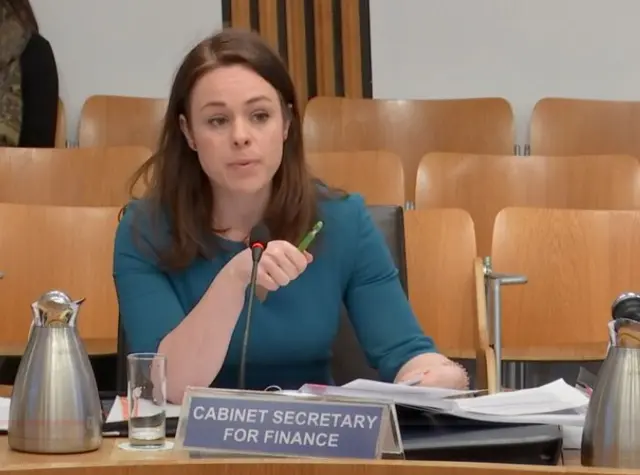
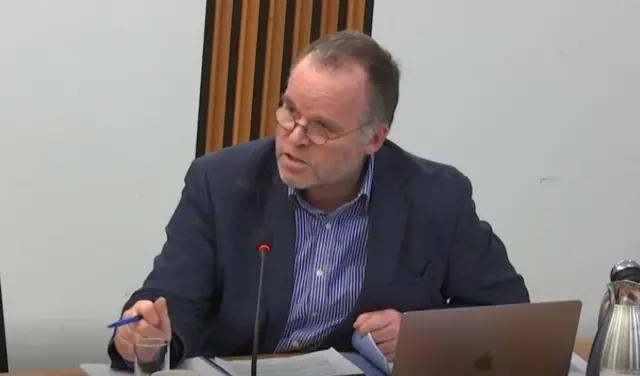
Green MSP Any Wightman turns to the core disagreement over Cosla's claimed funding gap of £95m.
Those are Cosla's figures, not mine, says the finance secretary.
She says a new commitment of £100m to ensure the real living wage for social carers is among the disputed figures, which she insists is a core service.
You're directing where they spend the money, says Mr Wightman.
My position is that we have funded local authorities to meet social care pressures, she says.
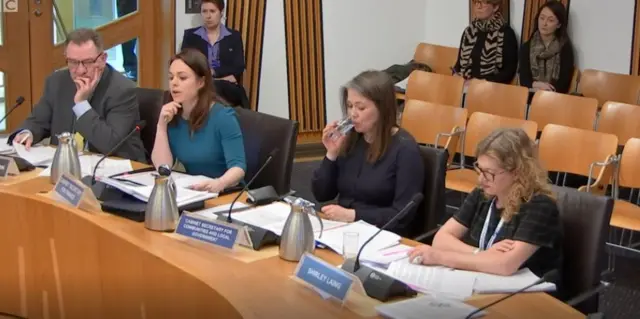
Ms Campbell points to the care review, saying there needs to be joined up thinking when it comes to spending.
Mr Simpson says the adaptations budget hasn't moved in 8 years - it's £10m. Increasing that budget will lead to savings in other areas, he says.
That funding pot shouldn't be viewed on its own, she says, there are other funding pots available from local authorities.
Work is needed to deploy resources better, she tells the committee.
Mr Simpson pivots to the budget for homelessness, saying the Salvation Army has said the government has allocated £50m for the Ending Homelessness Together Fund, but councils have submitted proposals calling for £130m.
The Tory MSP says his party has called for an additional £10m to tackle homelessness.
The local government minister replies the full amount the government has, has been deployed, so to increase the allocation would require a discussion about where the funds would come from.
Ms Campbell says there are a suite of measures considered to be the strongest rights in the world for homeless people.
The minister accepts the government can't be complacent and there is a long way to go to tackle homelessness, which will require a culture change in the delivery of services.
She says again if people want to see an increase in a particular line there will have to be a decrease in another, but the negotiations are ongoing.
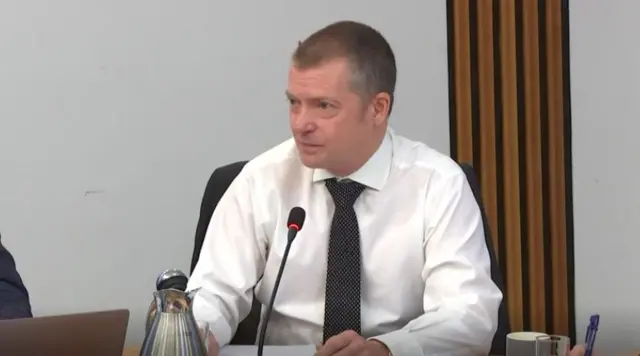
Cosla claim a funding gap of £95m and a capital funding deficit, insists Mr Simpson.
A budget deal with any other party will see a need for more council funding, he says.
Compromise will be required admits Ms Forbes, but more council funding will see cuts elsewhere.
Tory MSP Graham Simpson asks if the minister accepts most councils, if not all, will have to make cuts.
I accept that we are operating in very challenging fiscal environments, replies the minister saying after adjustments for things like health consequentials, there there will be a real terms decrease on the 11 March.
"We have deployed every penny on the face of the bill."
She does not accept that councils will have to make cuts and she says again there isn't a billion pounds of resource.
Finance Secretary Kate Forbes says it is critically important the decisions around the settlement are seen in the context of education and social care.
Ms Forbes says, in terms of the call for more cash from Cosla, "there isn't an additional one billion pounds of support in our funding".
That's why the government is funding commitments in education and social care, she adds.
"It's a challenging time for us all," adds the minister.
She says the funding package from the UK government is poor compared with ten years ago.
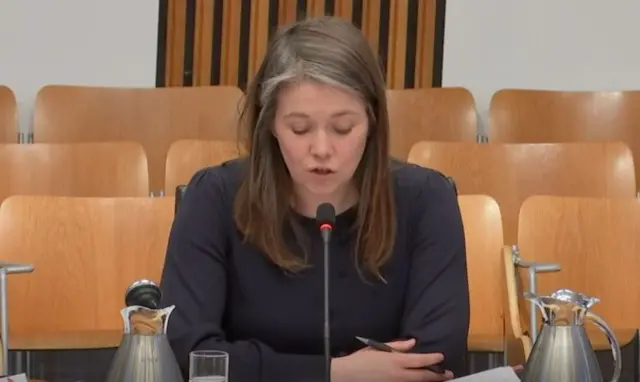
Labour MSP Sarah Boyack asks Ms Campbell about non-core funding for things like libraries.
The cabinet secretary points to an increase in funding from the budget to be spent at councils' discretion.
"It's challenging for us all", and we continue to work with them on shared agendas like child poverty, she adds.
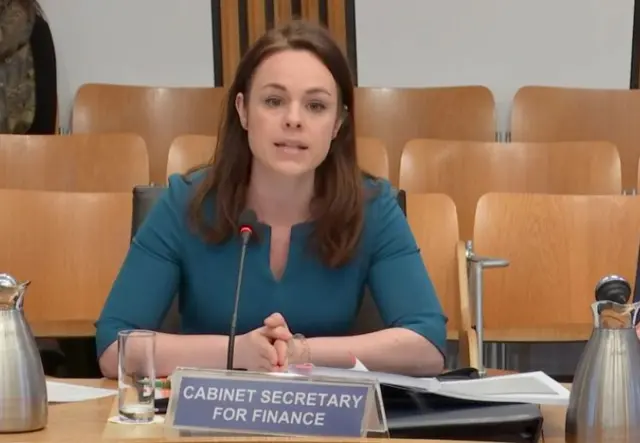
Ms Forbes says the government intends to continue supporting local authorities to deliver key services.
She argues the Scottish resource budget, if health consequentials are removed, has been cut by 7.7% in real terms since 2013/14.
The Scottish budget is being set after years of austerity, she explains.
 Douglas Fraser
Douglas Fraser
Scotland business & economy editor
The sofa of Scottish government budgeting has been thoroughly rifled. All possible hiding places for stashes of cash, for use in a potential budget deal with opposition MSPs, have been cleaned out.
There's nothing stuffed down the back, insists stand-in finance secretary Kate Forbes. "Every available penny is on the face of the budget." No, this is not like previous years, she tells a sceptical Tory, Murdo Fraser.
So if opposition parties have more for councils at the top of their list of demands, the stand-in finance secretary says they're going to have to say where it comes from.
This was the public message to Holyrood's finance and constitution committee, ahead of private meetings with representatives of Conservatives, Greens, Liberal Democrats and the Convention of Scottish Local Authorities. Labour's team is scheduled to meet her next week.